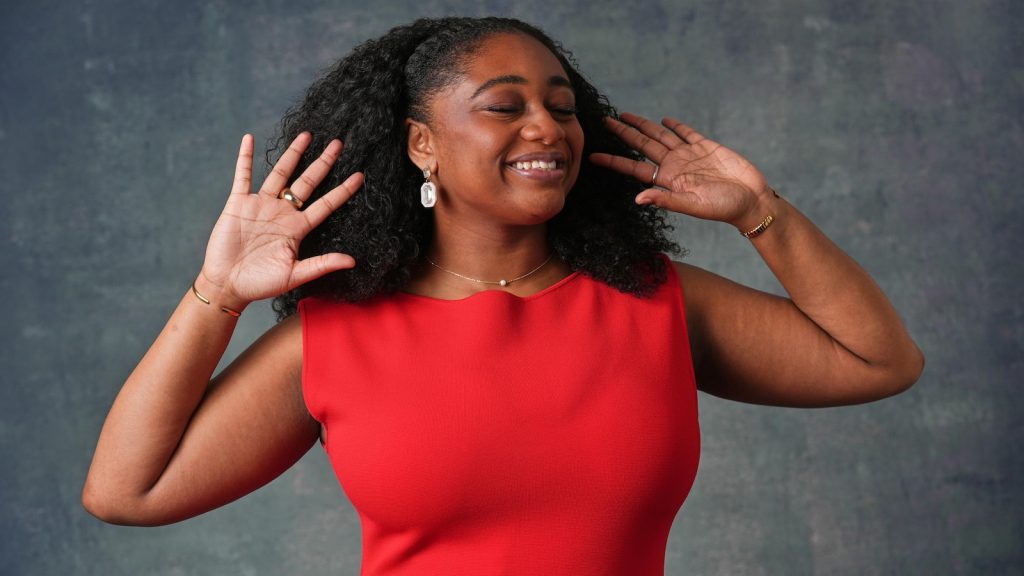LOS ANGELES — LOS ANGELES (AP) — Samara Joy’s voice has the ability to transform listeners to the early jazz clubs, filling them with warm nostalgia for legends like Ella Fitzgerald and Sarah Vaughan.
At 25, Joy is a five-time Grammy winning recording artist, whose album, “Linger Awhile” won her best new artist and best jazz vocal album in 2023. She’s been praised by artists like Chaka Khan, Regina King and Quincy Jones and has amassed a large following of her Gen-Z peers on TikTok, introducing a new generation to jazz.
Last year, Joy released “Portrait,” her third and most personal studio album allowing listeners into the tension between excitement and feeling overwhelmed that often follows a whirlwind of accolades and success. Her first original song “Peace of Mind” fully captures this moment.
“I wrote it in a time where I was really questioning whether I could continue or not because I was so exhausted,” said Joy. “I reminded myself through that Sun Ra composition that I have experienced something wonderful, and it doesn’t have to be the end all be all. This is just the beginning … this is just a springboard for all of the other creative ideas that I have and what I feel like I have to offer.”
For Joy, releasing “Portrait” was a creative challenge and a turning point toward trusting her creative instincts.
“It’s taught me a lot about what I can do and to stand firm in the creative vision and the direction that I see for myself,” she said.
Joy sat down with The Associated Press to talk about life post-Grammy wins, how diving into “Portrait” helped her grow as an artist and what it means to make her mark on the classic genre.
This interview has been edited for brevity and clarity.
JOY: This album was a turning point. Because I feel like it was the first time I really had to make a decision about what my path was going to be. With the first two albums, it was just songs that I loved and felt like I could interpret as my own. And this album, “Portrait,” was the first time I felt like I took the reins of creative direction and band mates and songs. And honestly kind of opened up even more to my band mates and said, arrange. I want you guys to orchestrate this next era.
So, it was definitely a big leap, I think, from maybe what people thought I should do after the second album after the best new artist. And I think this album taught me the importance of patience and not rushing to stay relevant or spark up a moment or just stay in that moment. It taught me to just take my time and really wait until you have something you feel like you have to say.
JOY: I never expected to be nominated. I never thought that that was a possibility, at least so early on in my career.
Even thinking about it now, I can see everybody still and still feel the way that I felt that night. It’s a night that I will never ever forget. And I’m thankful. I’m really thankful to everybody who believed in me enough to allow me to have that moment, who voted, who listened to my music, who support me then and still support me now. Which is why I never want to lose sight of what I do this for.
JOY: A couple years ago I did the Hollywood Bowl and it was a birthday celebration for Quincy Jones — Patty Austin, I got the chance to sing alongside of her. And backstage, you know, she was funny and sharp and quick, but she was just very supportive and very honest. And that meant a lot to me from somebody who has been in the industry for as long as she has and collaborated with Quincy Jones and George Benson and James Ingram and all these people to be so encouraging on this new journey as I kind of embark on it.”
JOY: I guess I never thought about it that way. There are so many wonderful artists that I draw inspiration from — Billy Strayhorn, Duke Ellington through the course of their lives contributed to the changing to the evolution of the music that we call jazz. I know that there’s always gonna be a certain sense of nostalgia and a certain artist or song that people can connect to or relate to easily because jazz is not mainstream, at least to me, I don’t think unless it is really, really, really, really watered down, I don’t think it will be.
But it’s an opportunity for me to once again be authentic and show people like, “Have you ever heard of this Abby Lincoln song?” Or maybe this Thelonious Monk song doesn’t have lyrics, but I can put lyrics to them and share a different, you know, a different compositional style. And a different voice in jazz. And so I guess that’s my way of reclaiming it and educating in a way and just introducing people to the sound that they may not recognize at first, but good music is good music.
JOY: I feel very honored and sometimes undeserving because of how new my relationship to their music was initially. I hadn’t really listened to their music or their voices at all growing up and getting introduced to them in college, it just felt like another world had opened up and I felt like I wanna sing, I wanna be able to move people the way that they move me with their voices.


